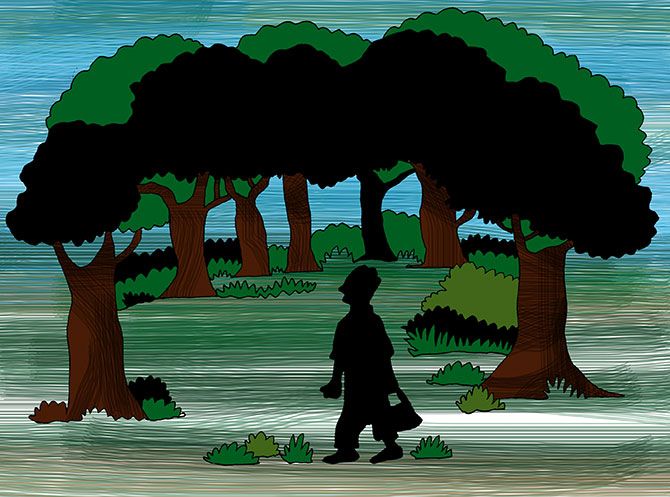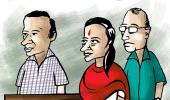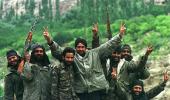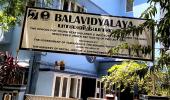Ganesh Dhene said there had only been two or three mango trees in the grove, from where he found the skeleton, which he specified had no flesh on it.
Vaihayasi Pande Daniel reports from the Sheena Bora trial.
Illustration: Uttam Ghosh/Rediff.com

It was Ganesh Lakshman Dhene's craving for mangoes that led him to the decayed remains of Sheena Bora, near Gagode Khurd, Raigad district, on May 23, 2012, nearly a month after she was killed.
Dhene, who belongs to Hetavane, a Lilliputian-sized village then of population 550 odd, also in Pen tehsil, in Maharashtra's Raigad district, 15 km away from Pen (the sub-district headquarters), ran a business of decorating mandaps or marriage venues, tempo-ing it between locations with his likely gayly decorative supplies and bamboo.
He is also the police patil of this village, where he was born, brought up and has lived all his life.
Patils are the key officials of many a village in Maharashtra, since not every village has a police station. They have a quasi-judicial and administrative role and work under the authority of the nearest police outpost.
That hot, dry** day in the summer of 2012, Dhene told the court on Wednesday, June 19, 2019, in Marathi through his 'testimony in chief' conducted by CBI Special Public Prosecutor Ejaz Khan, "I was travelling from Javali village to Hetavane when I reached the village of Gagode Khurd at 8.30 am."
"I stopped my tempo on the side of the road, near some ambe jhaad (mango trees) to pick up mangoes that had fallen on the ground. While collecting mangoes I discovered a burnt corpse."
Dhene, wearing a very white, long bush shirt with black buttons and a pen clipped near his collar, over dark slacks, was testifying as Prosecution Witness 50 in the Sheena Bora murder case in CBI Special Judge Jayendra Chandrasen Jagdale's Courtroom 51.
A short, trim man, with a thick moustache and high cheek bones, who held the railing of the witness box in front of him with both hands, almost as if to steady himself, Dhene was distinguished by his enormous bright vermillion tilak that stretched two inches upwards on his forehead.
After discovering the skeleton/corpse, Dhene went home and called the closest police chowki (outpost) at Varsai (9 km away) and spoke to a V R Bhagat, who reported the matter to his senior.
They asked Dhene to meet them on that very same day at the spot where he discovered the body/skeleton (referred to as 'corpus' in court records, the legal term, from Latin, for a body).
Bhagat arrived there with a few other policemen, one of whom was named Magar and a doctor and they did a post mortem on the spot, removing, according to Dhene, a bone from the hand. Afterwards they buried the skeleton.
The police posse took Dhene's statement. By 3 or 4 pm the process was over and the patil went home to his village.
The distance between Javali and Dhene's village Hetavane is approximately 12.5 km and Gagode Khurd is more than half way. So Dhene would have had to return, according to him, 2.5 to 3 km to have met the police personnel at the site on May 23. He often journeyed on the SH 88/SH 104 given the nature of his business and was familiar with distances.
Dhene spoke, throughout the hearing, in a low, quiet tone, making thrifty use of words, emotions of any variety never taking control of the narrative. He perhaps never smiled even once, although he often took stock of the room.
Under Khan's supervision he efficiently completed his 'chief' in probably all of ten minutes or less.
His cross examination went on for nearly an hour or more pre- and post-lunch, with both Peter and Indrani Mukerjea's lawyers Shrikant Shivade and Sudeep Ratnamberdutt Pasbola respectively making it a point to personally cross-examine this milestone witness.
Dhene was also a witness who could be termed accidental, the second so far in this case.
With two of Mumbai's top lawyers in the house, the courtroom was rather full for a change. And stuffy, as usual, the musty, sultry air smothering the room. A varied assemblage of black-coated lawyers, who were either these lawyers's assistants or awed onlookers, took over No 51 in the afternoon session.
Shivade, who hasn't been seen at this trial since March when he was arguing for Peter's bail, mounted a scientific, step-by-step cross-examination of Dhene, in a pleasant, even tone. He covered ground methodically, leaving no stone unturned, like a conscientious house painter who orderly and painstakingly proceeds to sweep an area with his paintbrush.
Dhene mostly offered one-word answers or an emphatic "Ho (Yes)" to the wide-ranging but linear queries put to him by Shivade.
They ran like this:
How many mango trees were there in the grove?
What was the distance between the mango tree and the place of Sheena's remains (where he found the skeleton)?
Is it an old mango tree?
Is this your first experiences of encountering a corpse?
Were there only bones and no flesh on the skeleton?
Was the skeleton intact?
Was the skeleton measured?
How long was he at the spot, where he found the corpse the first time?
What time did he call the police?
How many hours later did he return to the spot to meet the police?
Wasn't the spot on government property? Yet he went there to collect mangoes?
Isn't there a temple near this spot, across the road?
Dhene said there had only been two or three mango trees in the grove, which was some 15 to 20 feet (west of the tree) from where he found the skeleton, which he specified had no flesh on it.
He spent ten minutes at the site of the corpse, first collecting fruit and later looking at the remains and went home and called the police at around 10 am.
And he returned again one or two hours later, he said, to the place of the corpse near Gagode Khurd.
The witness's replies to another series of questions from Shivade on the post mortem conducted on the skeleton were vague because he said he could not see what the police did with the 'corpus' when he met them there in the afternoon, as he was standing at a distance.
He confirmed that bones and teeth had been extracted from it by the doctor, but not how it happened.
The procedure took 15 to 20 minutes, he recalled. But yet Dhene was at the site for the second time from approximately 10 am to 3 or 4 pm.
Shivade devoted five minutes to understanding from Dhene the location of the particular temple that was near the place of discovery of the skeleton, whose topic he had already brought up with Dhene.
The lawyer, who is familiar with this terrain, because he has cases from time to time at Alibag court, quizzed Dhene further on the name of the temple and its distance from the where Sheena's remains were found.
A discrepancy seemed to arise when the witness specified the temple closest to the spot had no name, but he also said Baapdev temple, which Shivade asked about, was close by, when Baapdev temple is actually 3 km from the site of the discovery of the skeleton.
Shivade wondered how the priest in the temple, whatever its name, didn't have a view of the spot.
He was told the priest only came to conduct morning puja at the temple and went away and the site, where the corpse was found, was not visible from the temple. Or vice versa, because of the trees.
Dhene confessed he had never been to the temple.
Judge Jagdale chuckled as did the lawyers when someone commented that those who are devoted can maybe see The Spot.
Pasbola took over the witness from Shivade at close onto 3.15 pm and examined the Man from Hetavane for nearly an hour.
It was a very civilised, tranquil, interaction.
No raised voices. No shouting. No heat, apart from the lingering, stale summer heat.
Dhene was the kind of witness, maybe because of his quiet nature, who seemed like he could neither be provoked nor pushed to say more than a few words to a query and Pasbola, for some reason, didn't try either.
Indrani's advocate first checked if Dhene was still a police patil. Dhene said he was.
Judge Jagdale chose to interject, explaining to Pasbola and the room at large, "Police patils are very much respected."
Shivade agreed: "Powerful."
Judge Jagdale continued: "You are staying in a city. In rural areas police stations are 20 km away. Your police station is 1 km away."
Pasbola asked who had interrogated Dhene in 2015 and when he had met the CBI.
Dhene replied how it had been the Khar police, north west Mumbai, who began the investigation, and they had come to his home in Hetavane in 2015.
The CBI recorded his statement on September 30 of the same year.
Dhene's replies were delivered in such a certain, sure-fire manner that they seemed unquestionable. He was also unflappably calm, but not smooth in a sort of false kind of way, but owning a measured, serious approach that was hard to doubt.
There was something about his dignified villager bearing, one imagined, that commanded respect too.
From another point of view, his undetailed, short answers might have appeared to show disinterest. But that wasn't it exactly.
Pasbola, however, did unearth several oddities, of which the most glaring were:
- Dhene said it was the smell of the corpse that drew his attention and made him look for its source -- "I proceeded to the spot after getting the odour of the corpse." Yet he specified several times it was a sangaada (Marathi for skeleton) and not a shav (Marathi for body).
- PW 50 also said he had not called the police immediately from the scene of the skeleton discovery because "range nau ta." So he waited to go all the way home to make the call and not till his phone was in range.
- Nor did he consider heading straight to the Varsai police chowki, which was 4 km from the spot, while his home was 3 km or so.
Yet from that spot the Mukerjeas's erstwhile driver, Accused No 3 and approver, Shyamvar Pinturam Rai declared Indrani had called Peter in England the day before the murder and said she had found an ideal spot (to dispose of Sheena's body). Rai's assertion is a vital part of the charges against Peter.
Could it be because Indrani and Dhene had different cellphone providers? Or is something odd here?
Pasbola cleverly brought up a curious statement made by Dhene to the Khar police after discovering the skeleton/corpse, for which he knew no details nor had he any knowledge of its origins.
Pasbola in Marathi: "Did you state to the police 'Unknown persons have killed an unknown person for unknown reasons'
Judge Jagdale laughed.
Dhene: "Nay, nay (No, no)."
Pasbola asked in Marathi if he also said: "And tried to destroy the evidence by burning the corpse."
He could not explain why it was there in his statement to the police though.
Finishing his cross-examination, Pasbola accused Dhene of falsely deposing.
Dhene hardly reacted. He merely disagreed.
Shortly after, he left the courtroom and sat outside talking to Indrani and Sanjeev's police escorts.
Dhene was not the first witness of Wednesday. Before him a Debasis Mohanty, 47, who was working at Mumbai Metro in 2012 testified as a panch (the witness of a police panchnama or record of observation).
When the Khar police visited the Mumbai Metro office, Andheri, north west Mumbai, in 2015 to collect all papers relating to Sheena's working stint at this office, Mohanty had been the panch.
The only point of confusion was that on Wednesday he said they had been the Khar police and in his earlier testimony in 2015 he had said, for reasons he was unaware of, the Santa Cruz police had come to the Mumbai Metro headquarters.
After Dhene left the courtroom, Khan revealed he had another witness set up for the next day post noon, but that he had to call in the morning to see if the witness could actually make it because he was busy securing his house against the monsoon.
Judge Jagdale simultaneously puzzled and amused: "But the monsoon has yet to come!"
Pasbola raised an issue about the timings of the hearings. He said he was unable to come for 12.30 pm hearings because he had other legal matters to clear in the morning.
The judge again reminded the defence, like he had last time, and the previous time, and the time before that, and the time before that that he had orders from high court to hasten the pace of the trial. And that he had to show that the tempo was being maintained.
Pasbola said he had no problem with daily hearings if they could happen in the afternoon at 2.45.
The judge then questioned if the hearing began so late how would the 'cross' also wind up the same day.
Khan, who lives in Delhi but spends a few days each week in Mumbai working on this trial, before looking in on the Scarlett Keeling trial in Goa, refused to budge. He was very definite about having the hearing begin at an earlier timing and said he would start the 'testimony in chief' of each witness then and Pasbola could catch up in the afternoon with his cross-examination.
That didn't suit Pasbola either, who said he would like to be there for the testimony too, to make a call on whether he was needed for the 'cross'.
Judge Jagdale: "You don't trust your junior colleagues?"
Pasbola beginning to get upset: "I do trust everyone. I trust my colleagues. I trust the prosecution. I trust the court..." He also added that he realised Khan was a seasoned prosecutor.
A typical defence versus prosecution heated tussle started up. Except it got more forceful.
The judge spoke on the need to seek cooperation.
Pasbola offended, looking wounded, his voice rising, declared that in his 35 years of working in court no one had ever accused him of not cooperating. He said he could not thereafter be held responsible for any further delays in the trial.
He once more requested Khan to move the time.
Khan told Pasbola, that while he appreciated being complimented and called a seasoned prosecutor, he refused to change the time. He later said he believed it was important to be a hard prosecutor.
As he was exiting the courtroom, Pasbola muttered angrily that he would take himself off the case and they could then start looking for a new lawyer.
But before Pasbola exited and the hearing came to an end, Khan announced importantly, knowing the full consequences of his news, that his witness, for the next session -- after Thursday's witness -- starting some time in the coming week, would be Rahul Mukerjea, Peter's son from his first marriage and Sheena's partner.
There was a moment of silence.
Next week -- if Khan is able to summon Rahul, who apparently lives in Delhi or somewhere around there -- will start the most critical and historic testimony of this trial.
One can already visualise the media and lawyers crowding the courtroom. And the rows of television cameras outside the court, waiting to catch that lucky glimpse of Rahul.
And the tension in the room between Indrani and her stepson.
Will Peter be there?
Indrani hasn't been her bubbly, vigilant self in court of late. She spends most of the time in the accused box behind, her head bent over, writing notes, offering only cursory glances at the witnesses, not reacting to their testimonies or participating, in her distinctive eloquent fashion.
She seems to be more invested in talking to the powerfully-built, bald criminal lawyer Abdul Wahab Khan in the corridors outside of No 51, whose Facebook page motto is borrowed from the creator of The Godfather, Mario Puzo: 'A lawyer with a briefcase can steal more than a hundred men with guns.'










